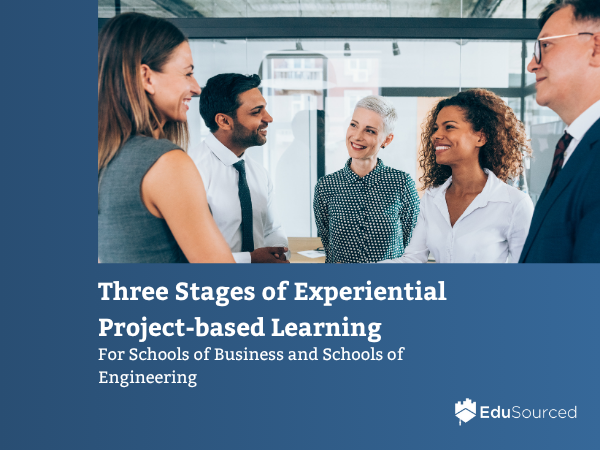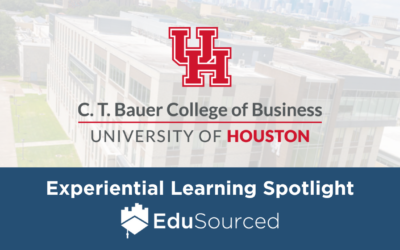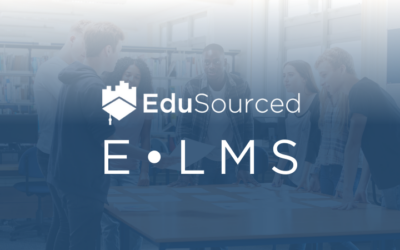Executive Summary: Beyond Instruction
In a presentation to UNC Charlotte’s Belk College of Business, EduSourced detailed a strategy for formalizing and scaling the school’s Experiential Project-based Learning. Reflecting on observed EL activity across the over 100 schools that use EduSourced and data collected in the company’s annual Experiential Project-based Learning Benchmark Report, three levels of Experiential Project-based Learning structure are detailed. Each level is expanded upon in this paper to explore a topic that is rarely discussed: the necessary support structure behind Experiential Project-based Learning.
Building a support structure for Experiential Learning is the difference between an ad-hoc, difficult-to-scale EL offering and a being able to offer EL projects that are consistently higher quality for both students and employers. The latter is sustainable and can be leveraged into student recruitment and improved industry relations. This paper details the spectrum of support structures that can be developed for Experiential Project-based Learning.
How to Scale Experiential Project-based Learning and Do More Projects
Scaling to do more projects is a common goal for both business and engineering schools but it is the outcome of a support system that must first be implemented. The ideal EL support system includes:
- School-level Project recruiting, most often to supplement faculty project sourcing efforts down at the course level.
- Record-keeping to know the past project clients, past students, and data on project outcomes for both parties.
- Clear ownership of Experiential Learning: employer-based EL projects do not occur naturally. Faculty may choose to do projects in their courses, but these projects are demanding to administer and so, in order to scale project volume, a person (or office) who are responsible for supporting Experiential Learning is ideal.
Level One: Ad-hoc
Level One is the default position of any school that has Experiential Learning projects in its curriculum. These schools have a project-based learning course (or courses) that rely entirely on the individual effort of instructors or faculty with no support from the school itself. High-quality, high-impact projects can happen at level one, but without any support structure from the school, this approach is not sustainable. If the instructors who choose to teach under this model with no school support leave, the EL offering at that school no longer exists. At this stage, a school’s projects should not be used promotionally for student recruitment as there is no assurance that project opportunities will exist by the time incoming students reach that course.
The Outcome of Level One
Employers may get substantial value of these projects, but there is no institutional safeguard for consistency and typically no institutional record of projects. At this stage, there is not enough substance to tout these projects to a school’s employer ecosystem for reputational gain.
What level one does offer is a foundation that can be built upon for future growth. A support structure can be developed around faculty and instructor expertise gained from projects delivered at this stage, provided the faculty or instructors involved are willing.
However, in some cases, these faculty are suspicious of school efforts to involve themselves and common concerns include:
- Worry that the school will co-opt the faculty’s personal connections used to source projects for other parts of the school (or that these connections will be mined for non-EL gift-giving).
- Concern for additional process being imposed on them by the school while teaching EL projects is already very demanding and time-consuming, especially when done without support.
Schools should be offering to support the instructor or faculty and reduce their burden, not add to it. Supporting willing faculty leads into level two, detailed below.
Level Two: Sustainable Experiential Project-based Learning
Level two is defined by having an owner of Experiential Learning at the school and cataloging project activity across the school. Note that school in this case means college-level and that this is almost never done at the university or campus-level.
Characteristics for Experiential Learning Owners
Ideally, this role is dedicated and schools often hire for industry experience. If creating a new position is not feasible, responsibility for Experiential Learning should be granted to an existing position with enough authority within the school to successfully collaborate with both faculty and employers.
Experiential Learning leaders do not have to be proscriptive with faculty about how to teach their project-based courses and they should not disintermediate existing faculty-employer relationships for project sourcing as these relationships are valuable as the third most common source of all project sourcing (2024 Experiential Learning Benchmark, page 18). This role ideally supplements and supports faculty who want assistance with recruiting projects and/or administering their projects with operational issues like project monetization, student team matching, etc. This support can be delivered with a tool like EduSourced, which was designed to support project-based learning based the principles outlined in this paper.
Supporting, Not Detracting, From Existing Faculty Efforts
If existing faculty and instructors who teach project-based learning are not interested in support (or if there are no instructors teaching this model), part-time instructors can be recruited from industry explicitly to teach projects in additional courses. Not every preexisting PBL course has to participate in this support structure since having unsupported PBL is superior to having no PBL. When building out an office of EL, recruiting instructors within the institution to teach PBL for the first time, or recruiting new instructors altogether, is the path forward for growth at many schools. EduSourced’s Experiential Learning Benchmark Reports over the years includes several mentions of this approach from participating schools with several suggestions to recruit instructors with industry experience to deliver high quality industry projects in the classroom.
The Outcome of Level Two
The beginnings of a formal EL program, achieved via program ownership, is sustainable enough within the school to be promoted to employers and prospective students. Project monetization, if desired, becomes possible with this level of structure and there is a stake in the ground to begin building institutional reputation on for EL for your school. This EL reputation can be immensley valuable in differentating the school to potential students and strengthening employer relationships. This value can be difficult to independently measure, but should not be overlooked.
Level Three: Full Integration of Experiential Project-based Learning
At Level Three, project-based learning is fully integrated with the school and its identity to both students and its employer ecosystem. Project participation does not have to be required for all students (though it often is at this level) but any student who would like to, can participate. Level Three schools have a dedicated Office of Experiential Learning with at least one full-time staff person whose sole responsibility is to oversee and support project-based learning. Additionally, this office coordinates collaboration with other offices like Career, Advancement, Corporate Relations, etc. to assist in recruiting projects and educate their external constituents on the school’s Experiential Learning offerings. All projects are recorded and archived with reporting available on project client history and student (and client) impact. The EL office has visibility into many, or even all, projects happening at the school and can provide assistance to instructors or faculty who wish to learn best practices for this teaching method.
The Outcome of Level Three
Level Three provides further enhanced consistency for both students and project clients, made possible by a school-wide effort to recruit projects, resulting in higher quality projects. At this level, project-based Learning is deeply rooted in the school’s identity and can be leveraged with employers and also be a centerpiece for student recruitment. Having a dedicated office of EL makes this level fully sustainable into the future. Projects can be substantially monetized, if desired, particularly if a “boutique,” elective project-based learning course or program is part of the school’s offering (monetizing projects at large scale remains difficult).
EduSourced is Built for Formalized Experiential Project-based Learning
EduSourced has been developed and refined over the past ten years to be the ultimate support system for Experiential Project-based Learning. This tool supports the classroom experience with secure, efficient student to client collaboration, tools for administering EL projects like efficient team matchmaking and provides a secure, private and central place for all of your school’s project records and reporting. To schedule a personalized demo for your program, fill out the form below.




